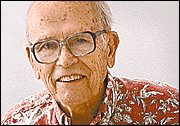Advertisement - Click to support our sponsors.


Hawaii’s World
IN World War II, America celebrated the sinking of millions of tons of Japanese ships. Alliance with Japan
must be preservedNow we are in a state of national remorse over sinking just one small one.
President George W. Bush had his secretaries of state and defense promptly express his regrets for the disaster last Friday afternoon off Diamond Head. Yesterday at Fort Stewart, Ga., he offered his own prayer for those lost.
Two important factors elevate this loss of a small training vessel and nine lives to an event of great sorrow.
First is our present strong alliance with Japan.
Second is our desire not to damage our mutual appreciation of the importance of democracy.
It now is a mantra among Foreign Service people that America's most important bilateral alliance is with Japan.
Former U.S. Senate leader Mike Mansfield probably said this every day of his long service as U.S. ambassador to Japan.
Our other VIP ambassadors have concurred -- former Vice President Walter Mondale and former House Speaker Thomas Foley, serving now until President Bush names a successor. (Elizabeth Dole is mentioned.)
Our strong cooperation is in the interest of both countries, economically and in terms of Asia-Pacific stability.
As to the democracy factor, we now know with some historical certainty that the U.S. and Japan probably would not have fought each other had Japan been a democracy.
A major contributor to this knowledge is a former Nobel Peace Prize nominee from the University of Hawaii, retired Professor Rudolph J. Rummel.
In the Korean War he was a young GI stationed in Japan, the nation about which he heard such horrible things while growing up. He couldn't reconcile those tales with the caring people around him in Japan who had joys and sorrows much like Americans.
"What made us fight each other?" he asked himself. He turned it into a lifetime of research.
He fed mountains of data about just about all the nations of the world into computers. Then he pushed buttons in search of correlations that would identify why nations might war on each other.
The startling result showed that no two democracies had warred on each other up to that point in the 20th century. When he published this research, other scholars extended the finding back through all of the first and second millenniums. Exceptions were very minor.
IT now is a credo of U.S. policy to promote democracy in the world. Democratic Japan is a showpiece of difference from its totalitarian past conquests along the Asian perimeter.
I had a strong personal demonstration that the differences lie with systems of government, not with individuals. I met and came to like and admire the late Capt. Mitsuo Fuchida, the leader of the Dec. 7, 1941, aerial attack on Pearl Harbor.
As our own military people would do, he accepted an assignment from his government and carried it out proudly. Our first meeting also was attended by two U.S. intelligence officers who had been under Japanese bombardment that day. They, too, reluctantly concluded that this was a fine gentlemen simply doing what his government had told him to do.
The Diamond Head accident was a disastrous mistake involving U.S. submariners, who are among America's finest and most carefully selected service personnel.
It was an accident pure and simple. It is deeply regretted but must not be permitted to shake America's most important bilateral alliance.
A.A. Smyser is the contributing editor
and former editor of the the Star-Bulletin
His column runs Tuesday and Thursday.